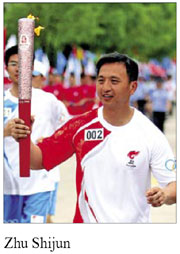Police officer carries torch for quake victims
By Lin Shujuan (China Daily)
Updated: 2008-05-29 13:24
Updated: 2008-05-29 13:24
HEFEI: Two days before the torch relay in Heifei, his name was not even on the list of the torchbearers.
Yet by the time Zhu Shijun picked up the torch Wednesday from first torchbearer Li Na, diving champion at the 2000 Sydney Olympics, loud cheers and applause greeted the hero although many did not know his name.

The 30-year-old police officer went to Sichuan soon after the May 12 earthquake to help in relief efforts; and came back to Anhui just for the torch relay.
Zhu was reluctant to reveal his name until the media promised him they would use it as a symbol of the millions in quake-hit areas working to rebuild their lives and homes.
"We are like a family there, the rescue workers and the survivors," he said. "When they are trying their best to save homes and protect families, who would you say is a hero, and who is not?"
Zhu had spent 10 days in Sichuan when he was told he would take part in the torch relay - and he said it took him quite a while to persuade himself to come back for it.
"It is not that I was not willing to be a torchbearer," Zhu said. "If it were normal times, I would have taken it like a godsend, a dream come true. It is a great honor. But in Sichuan, I felt I was leaving home when it was facing its toughest time."
One of his teammates helped put things into perspective.
"He told me: 'You think we are a family here. But don't you think the whole country is in fact a big family? They care about Sichuan as much as we do'.
"I came to realize that as a torchbearer, I serve as a messenger for the quake-hit areas, a connection between Sichuan and the rest of the country.
"It was vanity to consider it a personal honor. If I deserve to be a torchbearer, anyone in our team deserves it, too."
As he recalled his unforgettable experiences there, he sometimes tried hard to hold back tears. At other moments, he smiled as he narrated how they had a narrow escape. He called it "playing hide-and-seek with death".
"Once, we arrived at a land-locked village after marching 24 hours through the mountains. We expected to see grief-stricken survivors But they greeted us with tears of gratitude, smiles and hospitality."
Zhu said the hardest moment was when a boy held up a bottle of water he had saved especially for the rescuers and offered it to him. For the first time, the police officer burst into tears.
"It was at that moment I came to realize why Premier Wen Jiabao insisted that we reach the locals by any means as soon as possible," Zhu said.
"In fact, we couldn't take much to the survivors in terms of food and water since we had to cover a long distance on foot. But that's not the point. They needed us. They needed to know that they were not left alone."
At this point, Zhu paused to hold back his tears. A moment later, he continued: "We are there for each other. You take care of me because you want me to survive and live well. I take care of you because I want you to survive and live well. I have come to understand that life can be that simple yet beautiful. It is all about love and care, which nurtures hope for a better future."
It took Zhu almost two hours to clean up after he returned for the torch relay. His uniform was covered with dirt, sweat and blood. And for the first time since he joined the rescue effort in Sichuan, he slept tight for more than eight hours.
"Two hours in the air and I am in another world," said Zhu, who knows where he belongs.
Soon after the torch relay, he flew back to the quake area.
"I might not be able to make a big difference there, but I know they need me there," Zhu said.
"Because we are a family."
|
||
|
||
|
|
|
|